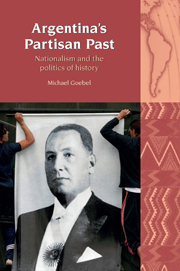Book contents
- Frontmatter
- Contents
- Acknowledgements
- List of acronyms and abbreviations
- Introduction
- 1 Argentina's two pantheons: from mitrismo to revisionism
- 2 Between co-optation and opposition: Peronism, nationalism and the politics of history, 1943–55
- 3 The deepening polarisation: the proscription of Peronism and its politics of history, 1955–66
- 4 The apogee of revisionism: nationalism, political violence and the politics of history, 1966–76
- 5 New narratives for a new era? Shifts, decline and resurgence of nationalist constructions of the past since 1976
- Conclusion
- Glossary
- Bibliography
- Index
3 - The deepening polarisation: the proscription of Peronism and its politics of history, 1955–66
- Frontmatter
- Contents
- Acknowledgements
- List of acronyms and abbreviations
- Introduction
- 1 Argentina's two pantheons: from mitrismo to revisionism
- 2 Between co-optation and opposition: Peronism, nationalism and the politics of history, 1943–55
- 3 The deepening polarisation: the proscription of Peronism and its politics of history, 1955–66
- 4 The apogee of revisionism: nationalism, political violence and the politics of history, 1966–76
- 5 New narratives for a new era? Shifts, decline and resurgence of nationalist constructions of the past since 1976
- Conclusion
- Glossary
- Bibliography
- Index
Summary
Introduction
The relationship between the power brokers in the decade following Perón's overthrow has been described as a ‘stalemate’ or an ‘impossible game’. Both concepts refer to the incapacity of three main political agents (the military, the Peronist movement – especially through the trade unions it dominated – and the Radical Party) to forge a viable political order, since each of these three had the power to block the implementation of the designs of the other two actors. The ‘Liberating Revolution’ of 1955 – initially led by General Eduardo Lonardi, who was influenced by Catholic nacionalismo but who was soon unseated in a palace coup by Pedro Eugenio Aramburu, who led the more ‘liberal’ sectors of the armed forces – was thus as unable to eradicate Peronism from the political scene as were the succeeding civilian governments, presided over by the Radical politicians Arturo Frondizi (1958–62) and Arturo Illia (1963–66). With the Peronists barred from participating in elections, each of these governments suffered from a lack of legitimacy, which ultimately resulted in yet another military coup in 1966. As is often the case, political instability was accompanied by cultural and intellectual ferment, set in the context of the extension of higher education and widening participation in cultural activities. As Oscar Terán and Silvia Sigal have argued, this lent intellectuals – despite or perhaps because of their position at the fringes of political power – increasing weight in the provision of (often radical) ideological narratives which influenced politics.
- Type
- Chapter
- Information
- Argentina's Partisan PastNationalism and the Politics of History, pp. 108 - 144Publisher: Liverpool University PressPrint publication year: 2011

